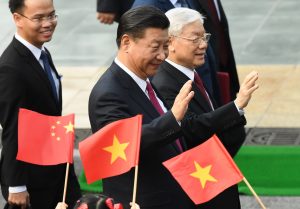At the invitation of Chinese Communist Party (CCP) Central Committee General Secretary and Chinese President Xi Jinping, Vietnamese Communist Party (VCP) Central Committee General Secretary Nguyen Phu Trong will pay an official visit to China from October 30 to November 2. It is not only a prominent demonstration of the special relationship between the CCP and the VCP, but also a positive signal about the steady progression of Sino-Vietnamese relations.
Xi and Trong have not met face-to-face since the APEC Summit in Da Nang, Vietnam in 2017. This is due to a combination of factors, including Trong’s poor health after the APEC summit, but also VCP’s focus on its top priority, the 13th Party Congress held in January 2021. Coupled with the travel restrictions on foreign visits after the outbreak of the COVID-19 pandemic, Trong has not had a chance to take a China tour – until now.
More recently Trong attended a series of official meetings in Vietnam, which is a clear sign of his improved health sent by the Vietnamese government. As a result, a short-distance foreign visit has become feasible. Moreover, the VCP’s 13th Congress was successfully held last year, and Trong was re-elected as the general secretary. That indicates that he has consolidated power in both the party and the government. With that achieved, Trong’s China visit was put on the agenda.
There are at least two major signals being sent by Trong’s visit to China at this time. First, Trong is the first foreign leader to visit China after the CCP’s 20th Party Congress, edging out Pakistani President Shehbaz Sharif, who will travel to China on November 1. As the top leader of the VCP, Trong wants to convey a clear message that the party has continued to maintain a special relationship with the CCP, the two biggest communist parties in the world.
What’s more, U.S. President Joe Biden is expected to visit Vietnam during the multilateral meetings taking place in Southeast Asia in November – including the G-20 Summit, East Asia Summit, and APEC Summit. Trong needs to visit China before Biden’s Vietnam trip, so as to convince China that the Sino-Vietnamese relationship is still the priority of Hanoi’s diplomacy.
On the eve of his China trip, Trong sent a congratulatory message to Xi praising the successful convening of the 20th Party Congress. “I look forward to see you again at an early date to have an in-depth exchanges of views on major strategic issues, so as to further enhance the political trust between the two sides and point out the direction for the future development of the bilateral ties,” Trong wrote.
As Vietnam is now in the vortex of the intensified China-U.S. competition, if not confrontation, it has to cautiously manage its relations with the two great powers. On the one hand, maintaining close relations with China has always been a top priority of Vietnam’s diplomacy; on the other hand, Vietnam has attempted to further develop relations with the United States. But Hanoi needs to allay China’s rising concerns about the fast-growing U.S.-Vietnam relationship in recent years, particularly the defense cooperation between Vietnam and the United States in the South China Sea.
In fact, Vietnam had long held to the “four noes” policy: Vietnam does not join any military alliance, does not ally with any country targeting another country, does not allow foreign countries to set up military bases in Vietnam or use Vietnamese territory against other countries, and does not use force or threaten the use of force in international relations. In order to enhance the mutual trust and lay a firm foundation of trust for the development of Sino-Vietnamese ties, Trong is likely to re-affirm this stance and try to reassure China that U.S.-Vietnam relations would not harm China’s relationship with Vietnam.
Both China and Vietnam see themselves as facing increasing ideological infiltration from the United States; the CCP and VCP alike feel threatened by the core values of the West, such as democratic elections and freedom of speech. Therefore, both sides have strengthened exchanges between the two parties and pursued useful ways to safeguard both their socialist systems and the governing power of their respective communist parties.
Last but not least, Vietnam expects to learn from China’s experiences on economic development and social stability and absorb more Chinese investment and technology to sustain its economic growth and social cohesion. For its part, China will try to promote friendly Sino-Vietnamese relations and maintain peace and stability in the South China Sea, so as to the achieve the goals of modernization and national rejuvenation, the main task of Xi’s third term.

































